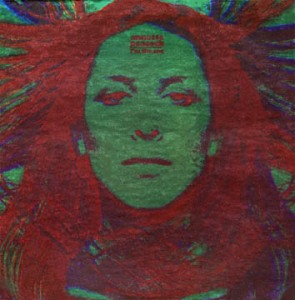Annette Peacock’s The One…
by Bill Henderson
If Annette Peacock hasn’t so far matched Carla Bley in the number and level of her achievements (she’s only recorded four albums and the one prior to her current record was released six years ago) she does equal Bley in her imagination and ideas. Nevertheless, her limited output forms a fascinating body of work and she has predated Bley’s move into a more “popular” rock-directed idiom.
Earlier this summer, she (like Carla) had difficulty in coming to terms with a jazz-orientated gig in London. More recently, however (at the beginning of last month) she gave a much more successful concert at the London Lyceum, performing primarily material from her current album, in a stand-up lead singer’s role fronting a band, which although containing jazzers, revolved on a rock axis (with Bernie Holland and Brian Godding on guitars, Pete Lemer on keyboards, Kumu Harada on bass, Dave Sheen on drums and Darryl LeQue on percussion).
But Annette has been gradually moving in this direction since the start of the decade. And, indeed, evenwhen she started writing for Paul Bley in the mid ’60s, she was always writing songs; with lyrics, that is, although they weren’t performed as such at the time.
As well as her highly original song-writing and her undoubted talents as a singer, Annette has been one of the pioneers of the use of synthesizers (although it is an area which she has not been involved in actively for some years) and, in particular, the exploration of electronic treatment of the human voice. When nowadays everyone form Herbie Hancock to the New York avant garde rock of Suicide is using vocal treatments, it’s worth recalling that Annette was doing so with (Paul Bley) from the end of the ’60s.
Annette’s history has been a constantly interesting one. Born in New York in ’41, she grew up in Southern California. She has been playing piano since she was a child but considers herself a totally untutored musician (“I only know of two real primitives in rock, that’s me and Beefheart,” was one of her characteristic quotes from a few years back.)
Her real involvement with in music began as the ’50s moved into the ’60s. She married bassist Gary Peacock in ’60, at a time when the “new wave” was taking jazz by the throat and sending it places it had never seen before . A climactic time that was to dramatically change the face of music and to turn a whole generation around, musicians and punters alike. Annette Peacock was one of them; her particular catalyst was Albert Ayler. Read the rest of this entry »
Filed under: avant garde, jazz, music, Albert Ayler, Annette Peacock, Miles Davis, Paul Bley


